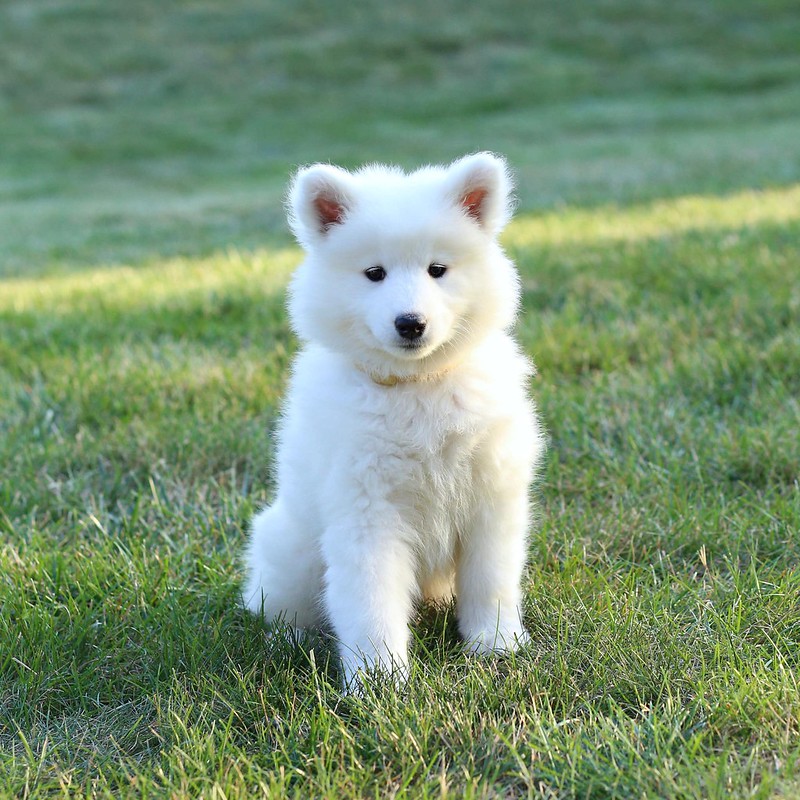Firstly, we needed a dog that was hypoallergenic due to the fact that my husband severely allergic to both cats and dogs. That eliminated our options by a lot. Next, we knew that we wanted a medium sized dog, not a miniature one. I was surprised to hear that the kids didn't not want a toy sized dog and my husband definitely did not want a toy sized dog either. Lastly, we wanted a dog that was family-friendly, good with kids and people. If you Google "medium sized hypoallergenic dogs" or just hypoallergenic dogs in general, Samoyeds rarely came up. I don't know why. Even though the Samoyed is one of the world's oldest dog breeds and the lush white coat is its most outstanding physical feature, it's not that popular. After we got Finn, I paid way more attention to dogs than I have before and I only saw one Samoyed so far in person. We did not know much about the Samoyed breed. We did lots of research, contemplated for a while, and a Samoyed seemed like the perfect choice. We couldn't find a Samoyed breeder in our area so my husband and Courtney drove all the way to Pennsylvania to pick up this little guy (on my birthday).
Facts and personality traits:
The characteristics of a Samoyed include its intelligence, gentleness, and its loyalty. Samoyeds tend to NOT be the best guard dog due to their overly friendly nature, but are very alert and and can hear even the slightest movement. Their temperament is affected by number of factors, including heredity, training, and socialization. Samoyed puppies with nice temperaments are curious and playful, willing to approach people and be held by them. When getting a Samoyed puppy, try and choose the “middle puppy”. Not the one noisily barking and terrorizing it’s litter-mates, but also not the puppy cowering in the corner. Always try and meet at least one of the puppy’s parents (usually it will be the mother), to make sure that they have nice temperaments that you’re comfortable with. Also, meeting the siblings or other relatives of the parents could allow you to predict what your Samoyed’s behavior will be down the line. We met his parents and his 7 siblings. Like every dog, Samoyeds need early socialization and exposure to many sounds, people, and other dogs when they’re young. It helps desensitize them to any future events that could possibly be nerve-racking to them. Enrolling them in a puppy daycare, taking them to busy parks, and inviting visitors to the home regularly are all great ways of introducing you dog to people. The Samoyed is a medium-sized dog with a height ranging from 19" - 24" and weight from 50 - 65 pounds. I just weighted Finn yesterday and he currently weights 51 lbs. He steadily put on 2 pounds every week up until he was 6 months old. He's slowing down quite a bit. I am guessing he'll stop growing when he reaches 60 lbs.
How to care for a Samoyed:
Samoyeds are very family-oriented. They enjoy being with large groups of people and cannot stand being alone for more then a couple hours. If you plan on getting a Samoyed, make sure there will always be someone in the house to take care of them. Samoyeds get anxious when they cannot be around somebody which then leads to destructive behavior, such as, digging, clawing, sprinting around the house, and last but not least, chewing up everything. Also, Samoyeds are very high energy. They require an immense amount of exercise every day. I walk him about 2-3 miles everyday, along with playing in the backyard for 30-45 minutes to tire him out. Samoyeds as not suited for apartment or condo life. A home with a large and secured fenced in yard, is the best choice. We have an invisible fence around the front yard and back yard when he was 4 months old. With his Nordic heritage, the Samoyed is a natural fit for cold climates, and love the snow (Finn will play for hours in the snow and not be tired). On the other hand, their thick double coat is very sensitive to heat and can even burn if left outside for too long. So in the summer, it is recommended to allow your Samoyeds to play outside for a little, but keep them inside where the air conditioning is for most of the day. So, yes Samoyed love to be around people and the snow and need need lots of exercise daily, but here is the part you are looking for… the grooming. Samoyeds require heavy amounts of grooming almost everyday. They are a double coated dog breed, so they will shed a lot. The mistake that owners have is usually they just brush the top coat, by starting at their head and brushing to their tail in one motion. That will cause matting or knots in the fur under that which is uncomfortable for the Samoyed, but also a pain to try and get out. A wide tooth metal comb is a perfect fit for a Samoyed. It allows you to take small sections of fur, lift it up and get into the undercoat well. Bathing can be a daunting task as well. The Samoyed does require regular bathing and brushing. A Samoyed can be bathed as frequently as weekly up to no longer than every 6 weeks. I bath him every 2 weeks. Bathing is very labor intensive due to the fact that you have to completely soak the fur (which is time consuming itself), shampoo the Samoyed and get every spot, and then allowing them to dry fully while consistently brushing to prevent matting.
How to train a Samoyed:
Long ago, Samoyeds were bred to pull sleds in below freezing temperatures. As they have domesticated, it’s been easier to have one as a pet, but at heart the Samoyed is still a hunter and gatherer. He or she is likely to chase after small animals that they perceive as prey. For his or her safety, they should always be leashed when they’re not at home or in a fenced yard. The guidelines for training a Samoyed, are very basic and self explanatory just as it would be with any other dog. Samoyeds are a very intelligent breed, but can be stubborn and only do what you want when they get something in return. The key is to be consistent. Use the same cue for the same command every time you plan on “practicing” it. For example, when wanting to get your Samoyeds to lay down, say “down” or “lay”, but once you decide on a command word, do not switch it up, or your Samoyeds will get confused. Using praise or rewards is a good way for your Samoyed to remember when they did correct. Short and sweet praise along with a couple treats will make the Samoyed excited that they have learned something new. Once, it has clicked in their head of what you are asking from them, you can start to reward sporadically and it’ll eventually lead to phasing out the treats entirely. As I stated previously, Samoyeds can be very stubborn, but you will have to keep your “cool”. Yelling, hitting, and jerking your dog around by a leash won’t teach them how to listen to you. As a matter of fact, it’ll teach them that you’re scary and unpredictable. Being fair, calm, and consistent is the best way to get a Samoyed to obey and respect you. But, if your Samoyed too stubborn and not willing to listen, a professional dog trainer is always another option. All dogs are different, so spend time with your Samoyed learning what it can or cannot do and then decide if a professional is worth the time. I will do a separated post to talk about how I potty train him, how to teach him to walk on leash and what products do I use to care for his double coats. Stay tuned!
Overall, a Samoyed is a great breed to have. They’re playful, loyal, and bottom line adorable. The girls are obsessed with Finn and wouldn’t trade him for the world. He’s apart of our family and we wouldn’t have it any other way. If you plan on getting a Samoyed remember, please be aware that it’s very time consuming and they require a lot of attention. If you want an easy-going/low-maintenance dog, a Samoyed is definitely not one (lol!). However if you love them and treat them with care, they will reciprocate it and love you back just as much (maybe even a little bit more). The Samoyed has a wonderful personality to match its beautiful appearance.











No comments:
Post a Comment